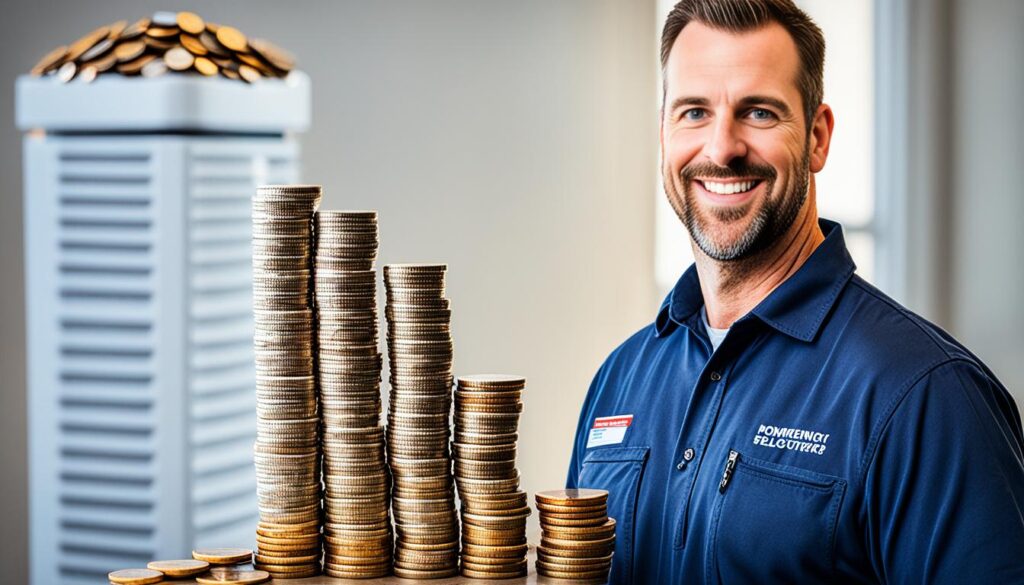Imagine being warm or cool at home and saving money on your taxes. Thanks to the Inflation Reduction Act, signed by President Biden, going green can save you money. Adding energy-saving items like heat pumps, biomass stoves, or efficient water heaters can cut your taxes by a lot.
The benefits apply to homes and businesses. You can get up to a 30% discount on clean energy items. Plus, some HVAC upgrades can get you a tax break of up to $1,200. These perks aim to boost energy efficiency and help save the planet.
Key Takeaways
- The Inflation Reduction Act of 2022 brings lucrative tax deductions for HVAC systems.
- You can claim tax deductions for HVAC systems, including heat pumps and biomass stoves, on your 2023 taxes.
- Implementing energy-efficient home improvements can lead to substantial cost savings.
- Eligible HVAC tax write-offs can reach up to 30% for clean energy equipment.
- Commercial properties also benefit from deductions under the EECBP if they meet high-energy savings thresholds.
Understanding HVAC Tax Credits and Deductions
To make the most of your HVAC tax credits, think strategically. The IRS has guidelines for these deductions. We’ll show you how to use these rules to cut costs and make your home more energy-efficient.

Inflation Reduction Act (IRA) of 2022
The Inflation Reduction Act of 2022 is a big deal for homeowners. It supports investing in more eco-friendly heating and cooling systems. By choosing things like solar panels, you can lower both your emissions and your taxes.
Energy Efficient Home Improvement Tax Credit
The Energy Efficient Home Improvement Tax Credit offers big savings. You can get up to $600 for a central air system or up to $2,000 for a heat pump. Just make sure your home is your main place of living and is in the U.S.
Eligibility Requirements for HVAC Tax Credits
Before you start upgrading, it’s important to know what the IRS requires for HVAC tax credits. They have some clear rules, including a $1,200 annual limit for upgrades. Planning your upgrades wisely over different years can help you get more back. Remember, these benefits are for existing homes only.
Are HVAC Systems Tax Deductible in Your Home?
Want to save money on taxes? Investing in an energy-efficient home is a smart move. The Residential Clean Energy Credit gives big breaks to homeowners. This tax credit is a perk from the Inflation Reduction Act.
Residential Clean Energy Credit
You can get up to 30% off on eco-friendly equipment costs. This not only covers typical HVAC but also biomass boilers and more. Your system must be ENERGY STAR certified and meet certain ratings. This credit saves you money and helps the environment.
Types of HVAC Systems That Qualify
Not all HVAC systems qualify for these tax breaks. To benefit, pick a system from the types of HVAC systems that qualify. Go for heat pumps, biomass stoves, and top-grade AC units. Make sure it’s ultra-efficient by IRS standards.
- Heat Pumps
- Biomass Stoves
- Advanced Central Air Conditioning Units
- Electric Home Rebates
- Geothermal Heat Pumps
How to Claim Your HVAC Tax Credits
Claiming credits is easier than you think. Before taxes, collect upgrade receipts and your Form 5695. This form unlocks your Clean Energy Credit. Install only the most efficient systems for max savings. Understanding how to claim your HVAC tax credits is key to not missing out.
| System Type | Efficiency Requirement | Tax Credit |
|---|---|---|
| Heat Pumps | ENERGY STAR Certified | 30% |
| Biomass Stoves | ENERGY STAR Certified | 30% |
| Central Air Conditioning Units | AFUE and SEER Certified | 30% |
| Electric Home Rebates | ENERGY STAR Certified | 30% |
Making your home more energy-efficient can pay off at tax time. Learn about the Resdiential Clean Energy Credit and which HVAC systems apply. This knowledge can really boost your savings.
Maximizing Tax Benefits from HVAC Upgrades
Putting in efficient HVAC systems at home is great for the planet and your pocket. You can use various tax breaks to save more money while keeping your house comfy. The Inflation Reduction Act is a big chance for homeowners to get these benefits.
Additional Benefits of Energy-Efficient Upgrades
Energy-friendly upgrades cut your energy bills right away. These changes mean you pay less each month, saving you money. Plus, your house will be more comfortable and the air cleaner with newer HVAC systems.
Combining Multiple Tax Credits
Joining different tax benefits is key when you upgrade your HVAC. Mix credits for things like heat pumps with other green choices to get more tax breaks. Remember, there’s a $1,200 limit per year. So, spread out your upgrades over a few years to get the most from your tax benefits. By planning, you’ll get a nice tax refund that can help a lot.
Conclusion
After installing your new HVAC system, remember it’s a gift from nature and tax savings. Your upgrades, meeting ENERGY STAR and Act standards, boost efficiency. They also trim your tax bill, making it a win.
With these green perks, the future looks bright. Follow IRS rules for HVAC deductions to gain all benefits. It creates a better home and possible tax savings, a great deal.
Every efficient step helps the planet. So, work on those HVAC tax deductions. Make your home greener by following IRS tips. This could lead to savings and a cleaner environment.








